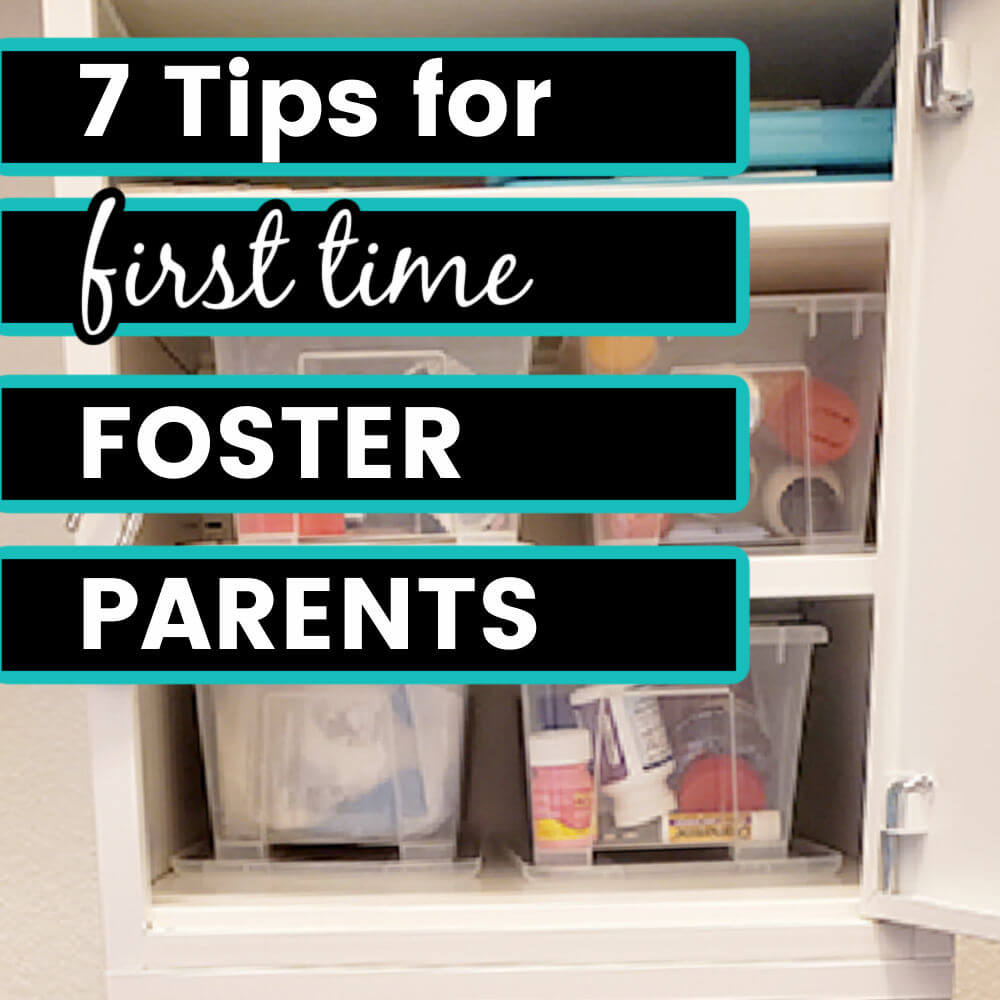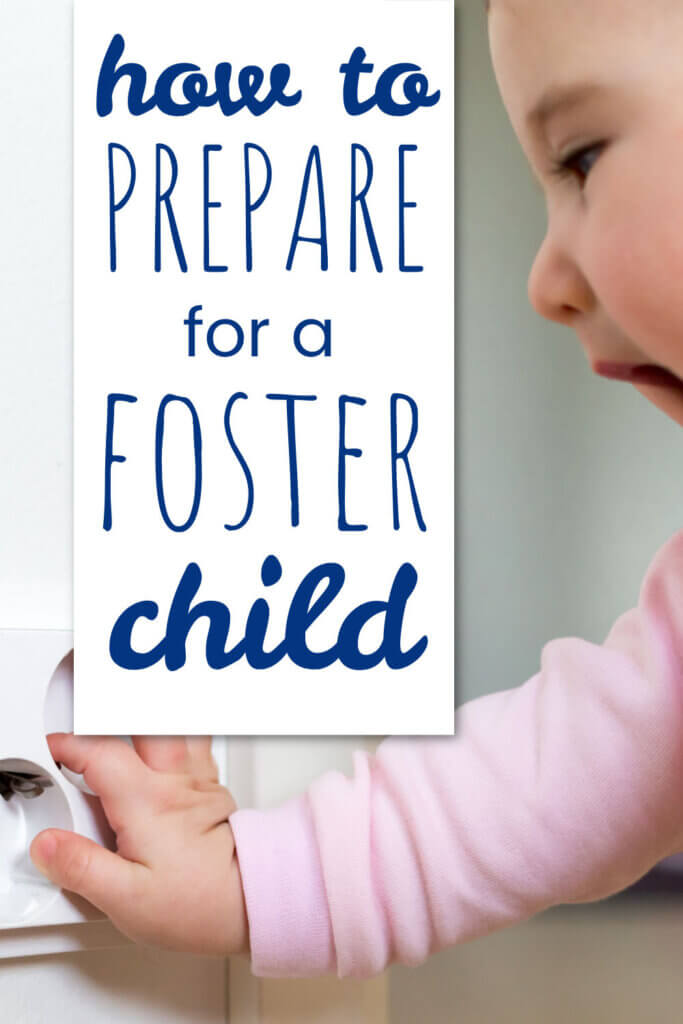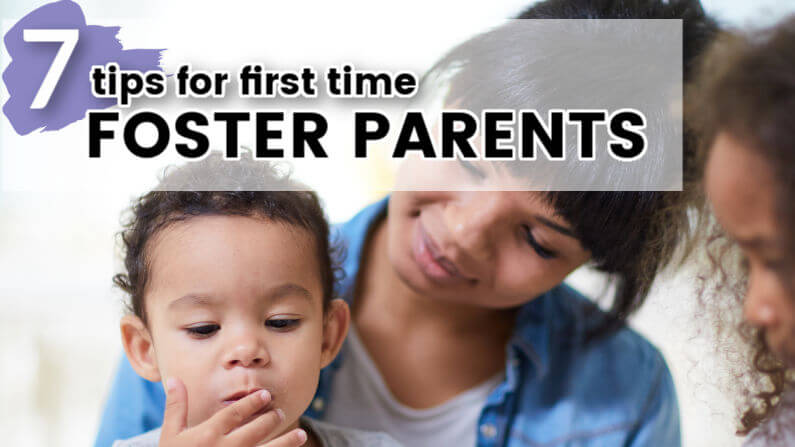Now that you have decided you want to be a foster parent, you may be wondering, what do I need to do to prepare for foster children? This is such an important question and, as you will soon find out, there are many aspects of your home and lifestyle that will need to be addressed.
My family has been providing foster care for the past six years. We have gone through the licensing process twice (thanks to an out-of-state move.) Over the years and multiple home study processes, I feel like we have become experts in how to prepare for a foster child. I have come up with a number of tips for first time foster parents to help you prepare to be a foster parent.
Decide Who You Will Get Licensed With
If you are asking how to prepare for a foster child, the first step is to decide who you will go through to get licensed. Some states are different in what they allow, so make sure to look into your state’s options. In general, you should be able to choose whether to get licensed directly through the State (Child Protective Services) or through an independent agency.
There are a number of considerations that will help you determine what is best. If you are wondering if you should get licensed through a foster care agency, think through these questions:
- Are you hoping to adopt through foster care? If yes, you will have better support and options by going through an agency.
- Are you nervous about the emotional and/or physical needs of the foster children you will be taking in and looking for ongoing training, support, and resources? If yes, then an agency will generally be a better bet.
- Are you looking for the easiest possible way through the licensing process? If so, then going through the state is often the less burdensome method.
The first time my family got licensed we went directly through the state. There were some definite advantages to doing this.
Advantages of going through the state
- No cost to get licensed
- No extra requirements outside of the state’s minimum standards for licensing. Many agencies will add additional requirements for their foster families such as no trampolines or requiring additional training hours.
- We got a daily email with available kids so we were able to be very proactive in seeking out placements.
There were also some distinct disadvantages to going directly through the state.
Disadvantages to going through the state
- The state social workers are working for foster children and bio-parents. Because of this, you, as the foster parent, often end up having no one fighting for you and your needs. We often felt like glorified babysitters and had trouble finding resources for our foster kids, our bio-kids, and our family.
- We didn’t have a screener between us and the placement desk, so we would get calls almost daily asking us to take in kids that did not fit our requirements. At first, it felt very guilt-inducing to say no and we even took in a foster kid that was older than we had agreed upon which ended up not being a great fit.
When we moved out of state and had to get relicensed I knew that I wanted to go through an agency. My main goal was to have better support and help when we needed to access resources.
So far, we have had a much better experience with our agency than we did going through the state. We have a dedicated social worker that is our families social worker. She screens available kids and only calls when there is a child that fits our requirements.
My favorite part of being with an agency is having someone to call when things are not going well. Having someone who is available to talk with you, support you, and encourage you makes such a huge difference in being able to have the endurance and energy to continue to serve difficult children.
We have also been pleasantly surprised that we are able to access some additional funds through our agency for clothing and necessities.
Prepare Your Home
Once you have decided who you want to get licensed through, it is time to start preparing your home. You will receive instructions on how to prepare for a foster child and what needs to be done for your home study including safety essentials and special requirements.
As I mentioned above, different agencies can have different requirements. In general though, here are some tips for getting your house ready to be a licensed foster home.
Safety Essentials
You will need additional safety essentials for your home. Depending on your agency and the age of children you plan on fostering, you may or may not need baby proofing items. One thing to note on this, if you are planning on fostering 3-7 year olds, keep in mind that they are often developmentally younger than normal kids their age. Our last placement with a 6 year old required a lot of child-proofing because he would get into anything and everything and also liked to put things in his mouth. (So scary!)
Here are the main items I would recommend for preparing for a foster child through safety-proofing your home.
Fire extinguisher
There may be specific requirements that you need to follow about the size and number of fire extinguishers. We are required to have one in the kitchen and one upstairs. We also have to have an inspection tag on the extinguisher and have it professionally inspected annually. I like this fire extinguisher from amazon for its price and ease of use.

Door Knob Covers
We tried out a number of doorknob covers to help with our previous placement who liked to get into everything (and go outside whenever the mood struck him.) We found that we had to get ones that were big enough to fit our mushroom-shaped handles. We also found that putting a sock on the handle under the cover made it much harder for him to figure out how to open. These are the best safety handles we found for our doors.

Key Pad or Magnetic Door Locks
Some of our doors had pull handles and we weren’t able to find great covers for these that were actually child-proof. We ended up putting a couple of keypad locking door knobs on doors that we really wanted to keep closed (the garage, a closet with cleaning equipment.)

These handles are a bit pricey so another option we looked at was magnetic door locks. I was worried that I would lose the magnetic key which is why we ended up going with the keypads.
Sliding Glass Door Locks
Another challenge we had was our sliding glass door. We needed something that would easily lock and unlock so that we could let our dogs out multiple times a day. But, we also needed it to be something that a child couldn’t reach and unlock themselves.
These baby locks ended up working really well. They even withstood major temper tantrums where our kiddo was trying to open the door and get outside.

Outlet Covers
Outlet covers are an important safety item. I like these clear ones that lock in place both for being subtle as well as actually working to protect kids.

Door Chimes
Another really important safety item for any age of foster kids is installing door chimes on your doors. This will alert you any time that your doors are opened. We have a security system that dings upon open right now but I used to use these inexpensive door chimes and they worked great!

Medication Lock Boxes
Another thing to consider is that you will most likely need a plan for locking up medications. In our old house, we were able to convert a closet into a medicine cabinet. I hung a clear plastic shoe holder system on the door and put all of the medications in that. I also stored all of our alcohol and cleaners on shelves in this closet. I then put a lock on the door and that satisfied the requirements.
In our current house, I don’t have a closet that would work so I found a locker style cabinet and use it to store alcohol and medicine. This isn’t my exact cabinet but it is similar to this locker.

Fire Ladders
If you live in a two (or more) story house or apartment, you will likely need to have a fire ladder. Make sure that you buy one that is big enough to reach the ground from the window. This is the brand that I have.

Prepare a Foster Bedroom
Now that you have covered all of the safety items, you will want to turn to preparing a foster bedroom. I have a whole article on how to prepare a foster bedroom that you can check out for more details.
In general, though, make sure to decorate the space as age and gender-neutral as possible. When we first started fostering I thought that I only wanted to foster girls. After our first placement, it was clear to me that I am much more of a boy mom. Thankfully I hadn’t painted the foster bedroom pink or anything!
One other really important aspect of the bedroom to consider is providing kids a safe place to store special belongings. Many kids will acquire gifts from their parents at visits and having space for them to keep these items is important. I have used tubes, toy boxes, and nightstands with shelves in the past.
Prepare Your Systems

One of the harder parts of foster parenting is keeping up with all of the paperwork. It can be completely overwhelming if you don’t have a system in place! So, when I get asked, how to prepare for a foster child, one of the first things I think about is creating systems for all of the paperwork and appointments!
I like to create a binder or folder for each of my foster kids where I can put their placement and medical consent paperwork. I also store past month’s records in here.
Currently we have to fill out medication logs, monthly behavior reports, incident reports as needed, and doctor visit reports as needed. I keep original copies of everything in one folder so that I can easily make copies for the next month and try to always turn my paperwork in within the first week of the month so that I don’t fall behind.
I also keep a stack of doctor visit reports in my car so that I always have them with me.
Prepare your relationships/family
While there are many practical things that need to get done to prepare your home for foster children, It is also important to keep in mind that you need to be emotionally prepared as well.
If you are married or fostering with a partner, it will be important to get on the same page about what you are willing to do and not do. Here are some topics that you should discuss when thinking about how to prepare for a foster child.
- Discuss what age, gender, and how many kids you are open to as well as what you are definitely not open to.
- Discuss how you will decide whether to say yes or no. I often get calls during the day when my husband is at work and unavailable. We have decided that I am able to make a decision as long as the child fits within our criteria. If not, then we have to discuss prior to making a decision.
- Talk about what issues, personalities, and preferences you are comfortable with. It is okay to know that you don’t want to work with medically fragile kids or with kids who have a history of sexual trauma for example. I also have found through the years that I do so much better with kids who don’t have severe ADHD. Because of this, I always try to find out more about how school is going for the child and if there are any known diagnoses. There are many kids in need out there and making sure that you only say yes to kids who will be a good fit for your family helps save additional trauma from having to ask for a child to be moved.
If you have bio-kids, this will be a huge transition for them and they will need your help preparing as well. Here are a couple of tips that I have gained over the years watching my boys adjust to the different foster placements we have taken on as a family.
- It is helpful to talk about your time and focus with your kids. While they won’t be able to fully understand, if you are able to forewarn your kids that the first few weeks with a new placement tends to take a lot more energy and time than it will going forward, this can be helpful. You can talk about the number of doctor visits, social worker visits, school enrollment, etc.
- Make sure to also talk to your kids about the fact that they don’t have to share all of their belongings. This is often a really hard topic for the first weeks with a new foster child in the home. Your kids have a lifetime worth of toys and belongings whereas the foster kids come with next to nothing usually. Make a plan for what your child wants to share and what they don’t want to share. Give them a space that they can put away special items. It may also be helpful to take your child shopping with you to pick out a few toys for the new kids prior to their arrival.
Prepare Your Support and Resources
Finally, in the quest to determine how to prepare for a foster child, it is incredibly important to make sure that you have prepared some support systems and put resources in place before taking your first foster child.
Being a foster parent can be exhausting, confusing, and just down right hard at times. You need people in your life who can support you emotionally as well as people who can support you by providing respite care when you need it. (Whether it is a weekend away to reconnect with your spouse or just a few hours to run to a doctors appointment – you will need respite at some point!)
Respite providers often need to go through a process such as being fingerprinted, background checked, etc. If you have a friend or neighbor who would be willing to do this for you, don’t be afraid to ask! People often want to know how they can help and this is a great way for people to be involved with foster kids without having to provide full-on foster care.
Another great source of support can come from foster support groups. You will probably be able to find some online options as well as in-person options. If you are able to connect with an in-person support group, this can be so helpful in connecting to the local resources as well as forming a support network around your family.
In addition to having support in place for you, make sure that you have a few options for emotional support and care for the foster children. I like to create a calm down kit that I allow my kids to use anytime they are feeling scared, angry, or any other big emotion. I include some relaxation tools, a calm down card deck, some fidget tools, and some comforting items. Having this ready to go for the first night has been really helpful!
How to Prepare for a Foster Child
As you can see there is a lot to be done as you prepare to become a foster parent. It is good to go into the process with this knowledge and understanding that it may take a while to go through the process so that you are fully prepared.
Keep in mind that you will want to prepare your house, your foster bedroom, your family, and your support system. Before you know if you will be welcoming your first placement!

